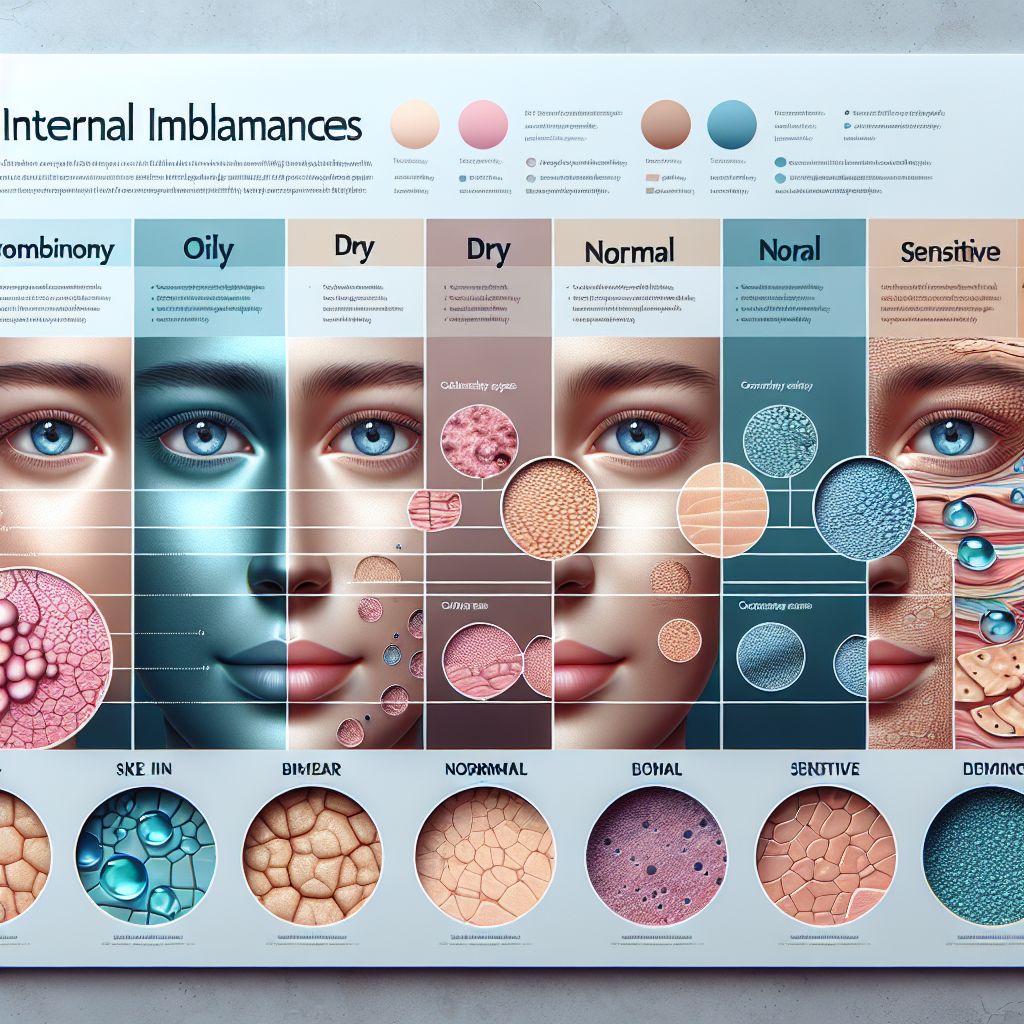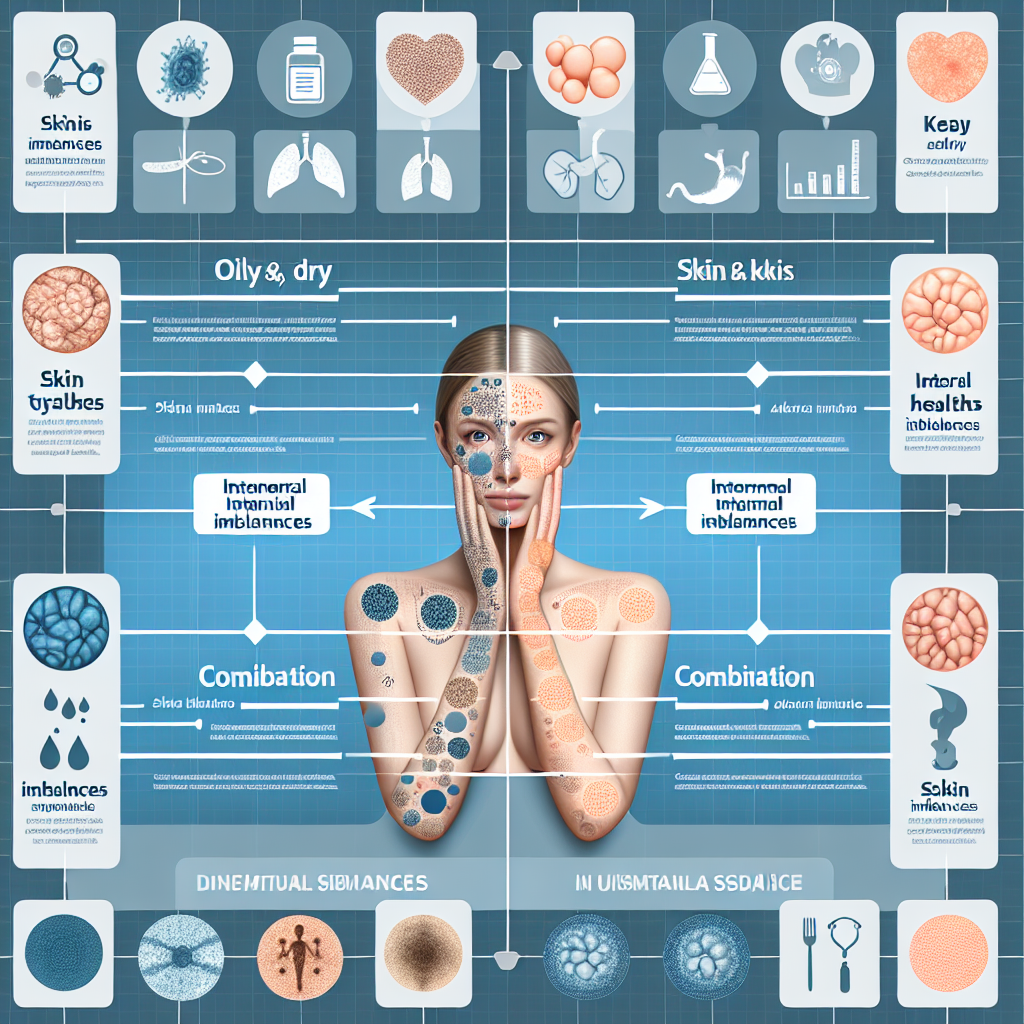What Your Skin Type Reveals About Internal Imbalances

Discover what your skin type reveals about your internal imbalances. Uncover the secrets to a healthier you by understanding the connection between your skin and your overall health. Click here to learn more.
Understanding Internal Imbalances through Your Skin Type
Your skin, the largest organ in your body, is a mirror that reflects your internal health. It is a living, breathing entity that can provide significant clues about what’s happening inside your body. Understanding your skin type can be a powerful tool in identifying internal imbalances and taking steps towards achieving optimal health.
The skin is a complex organ with multiple layers, each with its unique function. The outermost layer, the epidermis, acts as a protective barrier against environmental factors. The dermis, the layer beneath the epidermis, contains blood vessels, nerves, and glands that produce sweat and oil. The health and appearance of your skin depend on the proper functioning of these layers and the balance of oil and moisture they maintain.
Dry skin, for instance, can be a sign of dehydration or a lack of essential fatty acids in your diet. These fatty acids, found in foods like fish, nuts, and seeds, are crucial for maintaining the skin’s natural oil barrier. Without them, the skin can lose moisture and become dry and flaky. Moreover, dry skin can also indicate an underactive thyroid, a condition that slows metabolism and reduces sweating.
On the other hand, oily skin can be a sign of hormonal imbalances. The sebaceous glands in your skin produce sebum, an oily substance that helps protect the skin. However, when hormones like testosterone are high, the glands can produce too much sebum, leading to oily skin and acne. This is often seen in teenagers going through puberty but can also occur in adults with conditions like polycystic ovary syndrome (PCOS).
Sensitive skin, characterized by redness, itching, and irritation, can indicate an overactive immune system. This can be a sign of allergies, where the immune system overreacts to harmless substances, or autoimmune diseases, where the immune system mistakenly attacks the body’s own cells. In both cases, the skin can become inflamed and sensitive.
Lastly, aging skin can reveal a lot about your overall health. While it’s natural for skin to lose elasticity and develop wrinkles as you age, premature aging can be a sign of oxidative stress. This occurs when there are too many free radicals, unstable molecules that can damage cells, and not enough antioxidants to neutralize them. Oxidative stress has been linked to a variety of health issues, including heart disease, cancer, and Alzheimer’s disease.
In conclusion, your skin type can reveal a lot about your internal health. Dry skin can indicate dehydration or a lack of essential fatty acids, while oily skin can signal hormonal imbalances. Sensitive skin can be a sign of an overactive immune system, and prematurely aging skin can suggest oxidative stress. By understanding these connections, you can take steps to address the underlying issues and improve both your skin and overall health. Remember, it’s always important to consult with a healthcare professional if you have concerns about your skin or health. Your skin is a window to your internal health, and by paying attention to it, you can achieve a better understanding of your body.
What Your Skin Type Says About Your Body’s Internal Balance

Your skin, the largest organ in your body, is a mirror reflecting your internal health. It is a living, breathing entity that can provide significant clues about what’s happening inside your body. The condition of your skin can reveal a lot about your body’s internal balance, or lack thereof. Understanding your skin type and its characteristics can help you identify potential internal imbalances and take steps to restore your body’s equilibrium.
Dry skin, for instance, can be a sign of dehydration or a lack of essential fatty acids in your diet. These fatty acids, such as omega-3 and omega-6, are crucial for maintaining the health of your skin’s cell membranes, keeping your skin hydrated, plump, and youthful. If your skin is persistently dry, it might be a signal that you need to increase your water intake and incorporate more fatty acid-rich foods into your diet, such as fish, nuts, and seeds.
On the other hand, oily skin can indicate an overactive sebaceous gland, which may be a response to hormonal imbalances or stress. The sebaceous glands produce sebum, an oily substance that helps protect the skin. However, when these glands are overstimulated, they can produce excess sebum, leading to oily skin and potentially acne. If you’re dealing with oily skin, it might be worth exploring stress management techniques or consulting with a healthcare provider about potential hormonal imbalances.
Sensitive skin, characterized by redness, itching, or irritation, can be a sign of an overactive immune response or allergies. This skin type may indicate that your body is reacting to certain substances or environments. It could also be a sign of an internal imbalance in your gut health, as research has shown a strong connection between the gut and skin health. Probiotics and a diet rich in fiber can help restore gut balance and potentially alleviate skin sensitivity.
Meanwhile, combination skin, which is characterized by both dry and oily areas, can suggest that your body is experiencing multiple internal imbalances. This skin type may indicate that your body is struggling to maintain homeostasis, or balance, in response to varying factors such as diet, stress, or hormonal fluctuations.
Lastly, normal skin, which is well-balanced and not prone to oiliness or dryness, suggests that your body is in a state of good internal balance. However, it’s important to remember that even if you have normal skin, maintaining a healthy lifestyle is crucial to keep your body’s internal systems in balance.
In conclusion, your skin type can serve as a valuable tool in understanding your body’s internal balance. It’s important to remember that while your skin can provide clues about your internal health, it’s just one piece of the puzzle. A holistic approach, considering other factors such as diet, lifestyle, and overall health, is necessary to truly understand and maintain your body’s internal balance. If you’re concerned about your skin or suspect an internal imbalance, it’s always best to consult with a healthcare provider. Your skin is more than just a protective barrier; it’s a window into the health of your body’s internal systems.
Decoding Internal Health Issues through Skin Type Analysis
Your skin, the largest organ of your body, is a mirror that reflects your internal health. It is a living, breathing entity that constantly changes and adapts to the environment and your lifestyle. It is also a barometer of your overall health, revealing signs of internal imbalances. Understanding your skin type and its characteristics can provide valuable insights into your body’s internal health.
The concept of skin type is not just limited to the categories of dry, oily, combination, or sensitive. It goes beyond these classifications, encompassing a range of conditions and symptoms that can indicate underlying health issues. For instance, excessively dry skin may not just be a result of environmental factors or inadequate hydration. It could be a sign of thyroid dysfunction or nutritional deficiencies, particularly in essential fatty acids and vitamin A.
On the other hand, excessively oily skin could indicate hormonal imbalances. The sebaceous glands in the skin produce sebum, an oily substance that helps protect the skin. However, when these glands are overactive, they produce excess sebum, leading to oily skin and often acne. This overactivity can be triggered by hormonal fluctuations, particularly an increase in androgens, the male hormones present in both men and women. Conditions such as polycystic ovary syndrome (PCOS) can cause such hormonal imbalances, leading to persistent issues with oily skin and acne.
Similarly, skin sensitivity, characterized by redness, itching, and irritation, could be a sign of an overactive immune system or allergies. Chronic skin conditions such as eczema and rosacea are often linked to immune system dysfunctions or gut health issues. For instance, research has shown a strong connection between gut health and skin health. An imbalance in the gut microbiome, known as dysbiosis, can trigger inflammation and immune responses that manifest on the skin.
Furthermore, premature aging of the skin, characterized by wrinkles, fine lines, and age spots, can indicate oxidative stress and damage at the cellular level. Oxidative stress is caused by an imbalance between free radicals, unstable molecules that can damage cells, and antioxidants in your body. It is associated with various health issues, including heart disease, cancer, and neurodegenerative diseases.
Lastly, skin discoloration or hyperpigmentation can be a sign of adrenal gland disorders. One such disorder is Addison’s disease, which can cause darkening of the skin. It can also be a sign of liver disease or a symptom of hormonal imbalances, particularly in women during pregnancy or menopause.
In conclusion, your skin type and its characteristics can reveal a lot about your internal health. It is essential to remember that these signs are not definitive diagnoses but potential indicators of underlying health issues. If you notice persistent changes in your skin that cannot be explained by external factors, it may be worth discussing them with a healthcare professional. By understanding what your skin type reveals about your internal health, you can take proactive steps towards maintaining both your skin health and overall well-being.